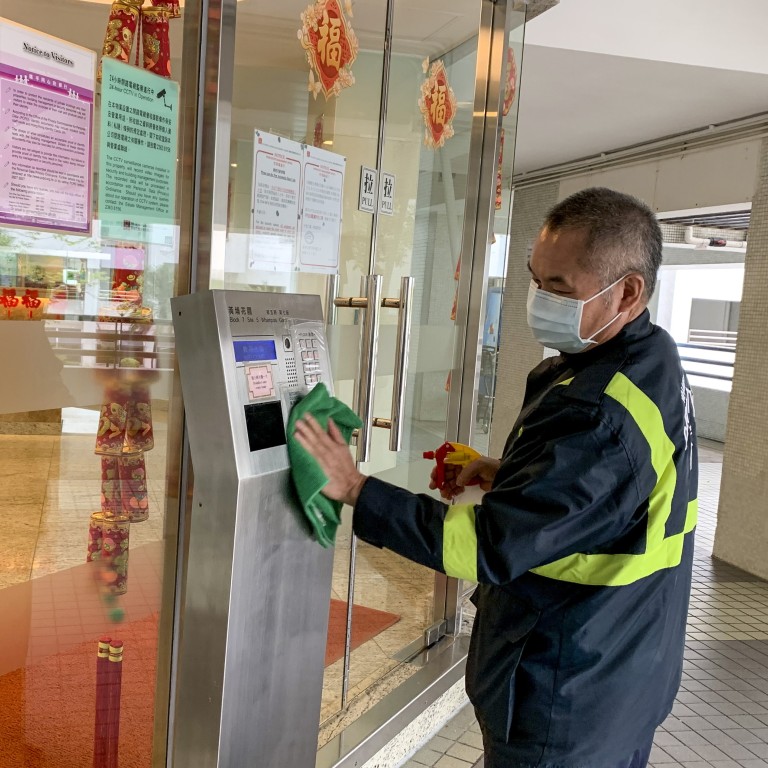
Coronavirus: the frontline workers left to keep Hong Kong safe without adequate protection against deadly infection
- Shortage of face masks leaves security guards, cleaners, and public transport workers at risk of catching disease
- Survey shows city’s cleaning services sector only has enough masks to last for about two weeks
Security guard Maggie Cheng disinfects the entrance of the residential building where she works during her 12-hour shift.
The 62-year-old said her company only required her to sanitise the doormat for people to step on before entering, but she went further and cleaned the entire area to protect residents against the deadly coronavirus.
Cheng, a security guard for more than 10 years, said the outbreak had increased her workload, and made her more aware of hygiene. As her company had run out of masks amid a citywide shortage, she used her own.
She said the virus did not scare her, as long as she maintained good hygiene at her workplace.
“There is no point in worrying. This is what I do to make a living. I can’t stay at home just because I’m scared,” she said.
The city’s more than 325,000 security guards, along with cleaners, and public transport employees, have been working on the front line amid the spread of the highly infectious disease. The nature of their work makes them highly vulnerable, especially as many of them are elderly.
More than 40,000 people have been infected by the disease, and over 900 have died during the epidemic, which has been labelled a global health emergency by the World Health Organisation.
Locally, the virus has infected 36 people and killed one, and despite the risk of being exposed, many frontline workers are not equipped with proper protective gear.
Street cleaner Ng, 69, wears a damp surgical mask while sweeping the streets in Aberdeen. Asking to be identified by only her surname, Ng said her night shift from 5pm to 11pm had not changed, but her company did not give her any protective equipment, or guidelines on how to deal with the outbreak.
She said she had only recently begun wearing a mask, but did so sparingly.
“The ones I wear were given to me by my daughter, who did not come by them easily,” she said.
A survey released last Thursday by the Environmental Services Contractors Alliance showed that the city’s cleaning services sector only had enough masks to last for about two weeks.
Group convenor Catherine Yan Shui-han said the outbreak of the virus resulted in a lot more work for cleaners, but the shortage of masks remained a concern, adding the sector needed more than 300,000 per day.
“The shortage of masks is already at hand, and not even two weeks away for many cleaning companies and workers,” she said.
Hong Kong leader Carrie Lam Cheng Yuet-ngor announced in a press conference on Saturday that the Correctional Services Department would increase the monthly production of masks – made by staff and inmates – to 2.5 million from 1.8 million, and provide the additional 700,000 masks for cleaners under the government’s outsourced service contractors.
The Food and Environmental Hygiene Department and its five outsourced service contractors have a total workforce of about 11,900 to provide public cleaning services, with about 3,100 under the department and about 8,800 under outsourced contractors.
The city’s public transport sector has also been under pressure amid the outbreak.
Henry Hui Hon-kit, chairman of the Citybus Employees Union, which represents about 500 bus drivers, said the company had issued a series of guidelines for its employees, including wearing masks at work and avoiding gathering at bus terminals.
He said the sanitation of buses had been reinforced, but the company provided only one mask for each employee per day because of a supply shortage, according to a statement issued to employees, along with hygiene guidelines.
To save masks, Hui, 57, who has driven a bus for more than 20 years, places a layer of tissue between his mouth and the mask to make it last longer. He also avoids contact with passengers.
“The priority is to protect ourselves, so that we can protect our passengers,” he said. He also urged the company to provide goggles, and disinfect the air conditioning units on buses.
But Dr James Fung Tak-kwan, a general surgeon at Pok Oi Hospital, said Hui’s method would weaken the protective function of the surgical mask by widening the space between the mask and face, creating more room through which viruses could enter.
Don’t let Li die in vain: scholars want justice for coronavirus whistle-blower
He said the public should not reuse surgical masks, or use one for more than eight hours. But considering the shortage of masks, he recommended people store masks in a clean paper bag with clean hands if they want to reuse them. Even then, one mask should not be used for more than a day.
Lawmaker Tony Tse Wai-chuen, together with representatives from various sectors, urged the government to provide more support for workers in property management, cleaning, and security, to ensure they had proper protection equipment. He said the government should allocate HK$1 billion (US$129 million) to support the three sectors over a period of six months.
“The government has provided support for other sectors like tourism and catering, but these three sectors also should not be ignored as their work requires them to be on the front line of pandemic prevention,” he said.

